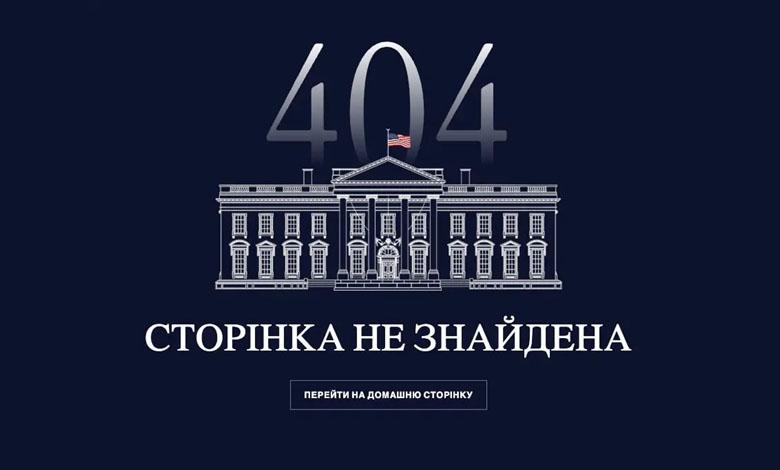The Budapest Memorandum has disappeared from the White House website. What does this mean for Ukraine?

“Whoever controls the past controls the future. Who controls the present controls the past”, – wrote George Orwell in his famous dystopian novel “1984”.
In the midst of a new wave of diplomatic pressure on Ukraine, an alarming signal appears in the information space: a page dedicated to the Budapest Memorandum disappeared from the official website of the White House. The move raises questions not only about the technical aspects of running the site, but also about Washington’s political intentions. After all, a memorandum is not just a page on a web resource. It is a symbol of international obligations to a state that has voluntarily given up nuclear weapons in exchange for security assurances.
Today, when negotiations between Kyiv and Moscow are stalling, and the tone from the US side is becoming increasingly cold, such a “redesign of memory” is becoming symptomatic. If attitudes to historical commitments are changing, what does this mean for the future? And what is the place in it for Ukraine?
Is the USA violating the Budapest Memorandum?
More than thirty years ago, Ukraine voluntarily gave up the third largest nuclear arsenal in the world. In exchange, it received political “security assurances” in the form of the Budapest Memorandum of 1994, signed by the US, Great Britain and Russia. The key point of this document is the obligation to respect the sovereignty and territorial integrity of Ukraine, as well as to refrain from economic pressure aimed at subordinating its interests.
One of the specific norms of the Memorandum states that the signatory nuclear states undertake:
“To refrain from economic pressure aimed at subordinating the implementation of Ukraine’s sovereign rights to its influence in order to gain any advantages.”
Today, when Ukraine is waging a war for survival, the question of the USA’s compliance with its obligations within the framework of the Memorandum arises with new force. According to the latest reports, the American administration is planning again stop sharing intelligence, new packages of military aid remain in question. The United States is putting serious pressure on Ukraine, forcing it to sign an agreement on access to Ukrainian minerals. This appears to be coercion that clearly undermines Ukraine’s sovereign rights over its own territory and is being used to benefit the US.
Is this a violation of the Budapest Memorandum?
Formally, no. The Budapest Memorandum is not an international treaty in the full sense of the word. It is a policy document that contains declarative commitments but does not provide for legal sanctions or enforcement mechanisms. In international law and diplomacy, such documents are interpreted as “toothless” — they are morally important, but legally weak.
However, from a political and ethical point of view, the situation is much more complicated. If it is really about pressure to obtain economic benefits – access to natural resources or other benefits – this is against the spirit of the Memorandum. Ukraine gave up its nuclear weapons in exchange for security and respect for its sovereignty. If now, at the most difficult moment in its history, Ukraine is forced to choose between help and preserving the right to make decisions independently, this situation calls into question the sincerity of the allies’ intentions.
Why is this important?
Because it is not only about Ukraine. It is a global order in which countries encourage disarmament by promising security, then renege on commitments when it becomes inconvenient. If the current practice becomes the norm, then what is the point for other states to disarm in the future?
In conclusion, the United States may not be violating the letter of the Budapest Memorandum. But there is every reason to talk about the violation of his spirit. And in international relations, reputation and moral consistency are sometimes just as important as legal norms.
Why does page disappearance matter?
Word search query Budapest Memorandum on the website whitehouse.gov currently does not give any result. Social media users are actively sharing screenshots confirming the fact of the deletion. And although the document can still be found in the archives, the gesture itself is telling.
Screenshot of request “The Budapest Memorandum” on the White House website
This is happening against the background of increasingly complicated relations between the administration of Donald Trump and the Office of the President of Ukraine. After a tense meeting in Washington in February and a series of “public cold showers” (say, a pause in intelligence sharing), the White House is increasingly showing war weariness.
US Secretary of State Marco Rubio, while in Paris, said: “We have to decide – in days, not weeks – whether peace talks are even possible. If not, you have to move on.” President Trump, in turn, added: “If one of the parties complicates the process, we will say: you are stupid, you are terrible people. And we will simply refuse to participate.”
Symbolism that hurts
Removing the reference to the Budapest Memorandum is not just a website edit. This is a signal that the US may be preparing to formally distance itself from certain commitments. And if today it is just a page on the Internet, tomorrow it may be a page in diplomatic history that they decide to turn over.
This is a wake-up call for Ukraine. Not only about changes in Washington, but also about the need to form a circle of security guarantees for the future ourselves – without illusions, but with historical lessons.
A piece of paper that could not withstand reality
The comments of X/Twitter users in discussions about the Budapest Memorandum increasingly resemble not legal polemics, but ethical reflection. The disappointment is deep — and it is not only that the document did not work, but that the international community openly shirks its responsibility. One commentator noted: it is difficult to imagine security guarantees that do not include military assistance or at least political condemnation of the aggressor. But this is exactly what the current situation looks like: Ukraine, which voluntarily got rid of its nuclear shield, was left alone with a nuclear state that defiantly violated the agreements, and at the same time did not receive a direct response from the guarantors.
The gap between the content of the document and practice is particularly painful. One user puts it clearly: most of the “guarantees” did not consist of active protection, but only assurances not to attack. In other words, there are negative rights: not to threaten, not to interfere, not to harm. And there are positive rights — aid, arms, direct intervention in the event of aggression, and they were not prescribed. And now, when Russia has trampled both the “spirit” and the “letter” of the memorandum, only the bitter realization remains: Ukraine made a historic bet on the good will of the powerful of this world — and lost.
A separate layer of discussion is moral. One of the participants in the discussion asks a rhetorical question: isn’t today’s American “offer” to stop the supply of aid a form of coercion? Is the demand to give up mineral resources in exchange for support not blackmail in a mild form? Another user responds through the prism of a philosophical essay: it’s not exactly coercion, but rather opportunistic exploitation. You are not threatened directly, you are simply told: “Either yes or nothing.” And if you have no alternatives, it’s like working at your kidnapper’s factory, because there is no other way out.
Coercion or opportunistic exploitation?
It is appropriate to consider the situation with the Budapest Memorandum through the prism of the classic philosophical dichotomy proposed by David Zimmerman, an American philosopher who, as early as the early 1980s, drew a clear line between coercion and exploitation. In his 1981 essay, he explained: For an action to be considered coercive, it is not enough that a person is faced with a stark choice. Coercion is when someone intentionally creates a vulnerable situation for another and then uses it for their own benefit. Exploitation, on the other hand, is when a vulnerability already exists, someone doesn’t create it, but willingly exploits it.
Zimmerman provides an example that demonstrates the difference between truly coercive offers and those that are merely exploitative. In his scenario, A kidnaps B, takes him to the island where he has his factory, and leaves him on the beach. All jobs in this factory are significantly worse than those available on the mainland. The next day, A turns to B with an offer: “Work in my factory – and I will provide you with food so that you do not die of hunger“.
According to Zimmerman, this is an example of a true forced offer. But if we assume that there is another factory on the island, and its owner finds out about B’s situation and manages to offer a job before A, then A’s similar offer is no longer coercion, but only an opportunistic form of exploitation. As Zimmerman notes: “Coercion goes beyond exploitation, however unacceptable it may beTherefore, the impact on the victim can be coercive regardless of whether the exploiter created the vulnerable situation himself or simply took advantage of the existing one.
As Zimmerman’s conceptual division shows, not every proposal in a vulnerable situation is coercive, but many are exploitative. And although from a legal point of view the USA can claim that it fulfills its obligations under the Budapest Memorandum, the moral plane reveals a different picture: a country on the verge of survival is forced to agree to conditions that it would never accept itself. And here it is important not only who promised what, but also who took advantage of someone else’s helplessness.





